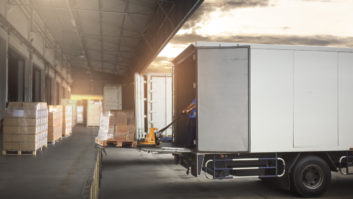
Add retailers and consumer tech manufacturers to the broad chorus of critics condemning President Trump’s tariffs on imported steel and aluminum.
Speaking for the National Retail Federation (NRF), the world’s largest merchant trade group, president/CEO Matthew Shay described the duties as “a self-inflicted wound on the nation’s economy,” just as consumers are loosening their wallets.
He predicted that any increase in take-home pay following the administration’s tax reform legislation will soon be offset by higher prices for products ranging from cars and canned goods to consumer electronics.
Watch: Electrolux Halts Tennessee Expansion Amid Trump Metal Tariffs
“A tariff is a tax, plain and simple,” Shay said, adding that the retail industry is also “extremely concerned by the administration’s apparent desire to ignite a trade war.”
Gary Shapiro, president/CEO of the Consumer Technology Association (CTA), echoed his concerns, fearing that retaliation by trade partners will create “a dangerous race to the bottom” that could ultimately cost far more U.S. jobs than the protectionist measures would create.
Indeed, Sweden’s Electrolux has already halted a planned $250 million expansion of a kitchen appliance plant in Tennessee, fearing that the tariffs will raise the price of the American-made steel it uses in all its U.S. products.
See: Electrolux Halts Tennessee Expansion
CTA’s Shapiro implored Trump to consider the failed tariff programs of the 1930s and, more recently, those of President George W. Bush, whose steel duties did more harm than good and were reversed after one year.
“We urge the administration to learn from past mistakes, reconsider its decision, and instead use trade remedies such as enforcement to address trade imbalances,” he said.
But the Trump administration has already demonstrated a propensity for trade sanctions, with the imposition last month of harsh tariffs and quota restrictions on imported washing machines.
See: Trump Oks Tariffs On Washers
The president signed an order yesterday levying duties of 25 percent and 10 percent, respectively, on imported steel and aluminum. Canada and Mexico were exempt from the action, pending a renegotiation of the North American Free Trade Agreement (NAFTA) with our neighbors to the north and south.
“We’re already seeing the national security benefits of this order,” Trump said at the White House signing ceremony, citing the reopening of an Illinois mill and the re-hiring of 500 workers by U.S. Steel. “That’s going on all over the country. And by the way, it went on with solar panels, which we did three months ago, and washing machines, where they were dumping washing machines all over our country and now they’re expanding plants to make washing machines.”
He added that “a skilled, trained workforce in steel is a crucial element of America’s national security and must be protected.”












